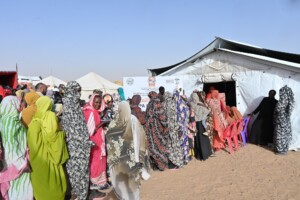‘Valid reasons for opposition to not sign AUHIP Roadmap’: SDFG
Sudan Democracy First Group has accused African Union mediators of “hasting into enforcing partial agreements” following a consultative meeting between Khartoum and opposition forces, that has resulted in the partial signing of a roadmap agreement. International actors have urged the opposition to sign the Roadmap too.
Sudan Democracy First Group has accused African Union mediators of “hasting into enforcing partial agreements” following a consultative meeting between Khartoum and opposition forces, that has resulted in the partial signing of a roadmap agreement. International actors have urged the opposition forces to sign it.
The African Union High-level Implementation Panel (AUHIP) invited the Sudanese government, three holdout rebel movements and the National Umma Party (NUP) for a consultative meeting to Addis Ababa in March, in an attempt to firstly break the deadlock on the peace negotiations on Sudan's areas of conflict, and secondly, ensure the opposition’s participation in the National Dialogue.
On 19 March, Chief Mediator Thabo Mbeki presented the warring parties the text of a roadmap regarding the accords to be agreed on for these two goals. Khartoum's delegation and Mbeki signed the document, which the opposition groups refused, accusing the AU mediator of taking the side of Khartoum.
Their rejection gained wide support among other opposition forces and Sudanese public opinion, Sudan Democracy First Group (SDFG) said in an e-mail to Radio Dabanga on Tuesday. “Several international actors started exerting pressure on opposition parties to accept the Roadmap Agreement without considering the substantive reservations to the draft and the AUHIP’s approach that led to it,” SDFG stated.
'The proposed roadmap turns a blind eye to the security aspect, and to military escalation in conflict areas.'
The Sudanese activists pointed to the fact that the AUHIP breached its mandate, set by the African Union Peace and Security Council, by replacing an obligatory preparatory meeting on the agenda of the National Dialogue, with this consultative meeting, to which it did not invite the National Consensus Forces and the Civil Society Initiative, among others.
'Security ignored'
The AUHIP “attempted to force the opposition to join this National Dialogue without obliging the regime to consider and respond to all of the reservations around this process that Sudanese opposition forces have expressed many times”, SDFG said. Meetings of the National Dialogue in Sudan have been ongoing since October last year.
Furthermore, the Roadmap Agreement ignores the contexts of the political and security paths in Sudan's conflicts, despite the attempt to combine the cessation of hostilities and the definitive ceasefire negotiations with the National Dialogue.
“The roots of the security aspect of the conflict,” SDFG said, “is not only related to the popular political demands in the conflict zones, but also to the refusal of the Sudanese regime of fully implementing the security arrangements of the Comprehensive Peace Agreement of 2005.”
Related to this, the roadmap turned “a blind eye” on the military escalation and waves of violence n Darfur, South Kordofan, and Blue Nile, carried out by the Sudanese government forces.
Amendments and proposals submitted by the opposition parties in the meeting were overlooked in the draft text of the roadmap. “The AUHIP insisted on unilateral signing with the Government of Sudan delegation without discussing the opposition remarks in a manner that bucks all traditions and foundations of mediation.”
The panel's insistence to sign the Roadmap agreement dealt a damming blow to regional mediation, the activists claimed, saying that the AUHIP is an impartial mediator because it is “aligned to the Khartoum-led National Dialogue”.
Troika, UN insistence
The USA, United Kingdom, Norway, and UN Secretary-General Ban Ki-Moon have welcomed the Roadmap Agreement, signed on 21 March by the Sudanese government. The 'Troika' did call on Khartoum to clarify commitments on National Dialogue, and encourage opposition to subsequently sign.
“If agreed to by all parties to the conflicts, the AUHIP Roadmap could allow genuine political dialogue at both regional and national levels that is needed to address the underlying causes of the armed conflicts that have plagued Sudan for so long,” the Troika jointly stated on 10 April.
The head of the Sudan People’s Liberation Movement-North (SPLM-N), Malik Agar, has stressed that they will not sign the document, “regardless of the pressures exerted”. The leader of the NUP, El Sadig El Mahdi, commented that Mbeki could have waited with the draft roadmap to look into the reservations and demands of the opposition.











 and then
and then